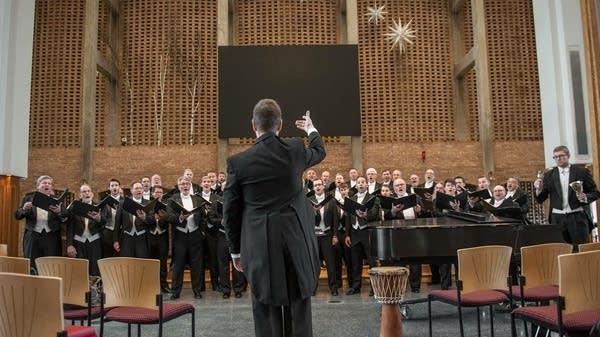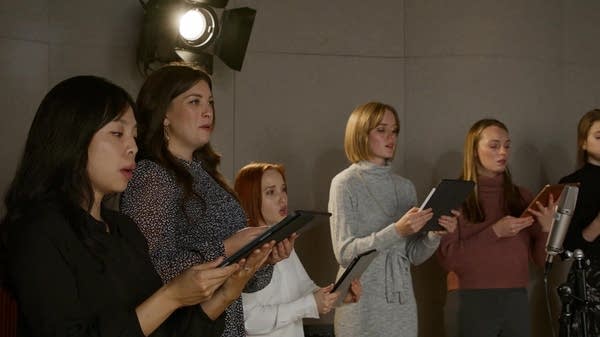Apollo, the mythologists say, was a big-time utility god for ancient Greeks and Romans. His portfolio included sun and light, health and plague, truth and prophecy, and arts such as poetry and, notably, music. No telling if he had a soft spot for glee clubs or whether he could have prophesied that a men's chorus bearing his name would endure in a Greek-sounding city in Minnesota.
In any case, the 65-member Apollo Club of Minneapolis is gearing up for its 125th anniversary in 2020. And, just as it was in 1895, it's still an all-guy thing.
One reason is that basses, baritones and tenors stir the musical soul in ways that contraltos and sopranos cannot.
"There's a sonority you get with a male voice," said Philip Brunelle, who leads the mixed-voice VocalEssence chorus in Minneapolis. "There's a depth and strength, a unique acoustic. … Male chorus singing is a very special part of the whole genre of vocal music. It has its own depth."
But it's not just deep vocal vibes that account for the Apollo Male Chorus' longevity. There also are family ties (fathers, uncles, sons) and an easy camaraderie that includes Sunday-night, post-rehearsal beers at a nearby bar and grill.
Tim Nichols, now 53, has sung with the Apollo for 30 years, five of them with his father.
"I joined because of the music," he said. "I stayed because of friendships. But I'm not the youngest anymore."
For other members, the Apollo connection touches on the spiritual.
"I'm not much of a Bible person," said Patrick Lair, 63, who is singing for his second year with Apollo. "But music is the way I talk to God. It bypasses my defenses. It makes me cry and brings me joy."
Brunelle said the Apollo shares in the tradition of "a fraternity of singers."
Its "grand era" might have been about 60 years ago, when there weren't as many male choruses around the area. Back then, the Apollo sang in the White House, in Carnegie Hall, for the soundtrack of a Cinerama movie, and in performances and competitions around the world. Soloists included the likes of Mario Lanza, Robert Merrill and former Miss America Dorothy Benham. It used to sing the National Anthem at Minnesota Twins games.
Dale Warland, who led his a cappella mixed chorus in Minnesota for a quarter century, said that until recently, concerts by male choruses "were weighted heavily with repertoire that falls into the 'folk' genre, i.e., 'arrangements' of drinking songs, sea chanties, folk songs, folk hymns."
It was a time when the nation's best-known male choruses were led by directors including Norman Luboff and Robert Shaw. By contrast, women's choruses often sang more original compositions by the likes of Johannes Brahms and Gustav Holst, Warland said.
"The exciting news is that this obvious difference of repertoire and programming is changing rapidly in our time … led especially by all-male chamber choirs of the late 20th century and early 21st century," he said.

They include the King's Singers, Chanticleer, Minnesota's Cantus and others.
"These chamber choruses have actively commissioned composers as a key part of their ongoing commitments," he said. "Large choruses have also picked up the mantle, and the Apollo Club is a part of this much-welcomed movement."
But surviving in a changing musical world can be challenging.
On the artistic side, the Apollo hired a new director two years ago. Aaron Humble had sung with all-male Cantus for 10 years. Then he spent a year in Illinois before returning to teach at Mankato State University. He had heard the Apollo Club perform previously at a choral festival and remembers thinking the group "could be in my future."
As a voice teacher at Mankato, a job he still holds, he has learned more about the different learning styles of men and women.
"To generalize, a lot of men learn from doing," he said. "With women [singers], they need more 'scaffolding' and framework" as they learn a piece of music. "Men just try it; they just do it."
By refining the Apollo's choral sound, Humble, 41, hopes to attract more young men, including those with experience in top-ranked college glee clubs. That would lower the average age of the chorus, whose members now range from their 20s to their 80s.
What kinds of refinements? Humble said he admires the way Warland is able to draw soft sounds from singers who otherwise might prefer to belt out their music.

"Soft [singing] requires more energy," he said, and the director's job is to "put a lid" on what otherwise might be a "pot of boiling water."
"Tenors like to sing everything loud," he said.
As a conductor with extensive singing experience, "You focus on shaping the sound, changing [members'] vowel shapes, their sonority, and their ability to remember that."
During a recent two-hour rehearsal on a snowy Sunday night, with his singers sitting in church pews and dressed in everything from T-shirts to heavy flannel, he asked them to "remember the power of a unified crescendo."
As they jotted on sheet music in black, three-ring notebooks, Humble also recommended "taking the Ls out of 'almost' and 'falling'" in one tune and replacing them with an "ah" sound. At another point, he asked them to "chew on those Ls" in "bells" and "peal." Finally, after several repetitions, he asked them to stand for a run-through, stirring some to add a bit of body language, as well.
If improving the Apollo's sound is one key to survival, another is tending to its finances.
Only about 15 percent of the group's $85,000 budget this year is expected to come from ticket sales, said Aaron James, the group's executive director, while 10 percent will come from the singers themselves; each pays dues of $350 a year. CD album sales have plummeted as music lovers download individual tunes. A small amount comes from selling ads in concert programs.
Most revenue comes from corporate sponsors and grants and donations from foundations and public arts agencies such as the Metropolitan Regional Arts Council. Some corporate funding comes from Apollo members' own companies.
James said many nonprofit organizations take a gamble when they spend more in an effort to attract more members. He has trimmed expenses, he said, and as a result, the Apollo rests on "a very solid financial foundation."
In 2017, the Apollo earned a spot in the Minnesota Music Hall of Fame, but if it is to endure beyond next year's milestone, it might have to continue changing its reputation as a mostly senior, mostly white performing group.

"We used to have 300 members," Humble said, although only 100 performed in concerts. "It was a force."
The club's first conductor, from 1895 to 1900, was Emil Oberhoffer, who also led the Minneapolis Symphony Orchestra (now the Minnesota Orchestra). Others included William MacPhail (1928 to 1947), who founded what is now the MacPhail Center for the Arts in Minneapolis, and Roger Hoel, who led the group from 1977 to 2012.
Some members said change became necessary near the end of Hoel's tenure in order to attract younger members. Curt McDougall, who has sung with the club for 29 years, said that when he joined, members were expected to memorize every song — 12 to 18 pieces per concert — but that "young guys with families don't have as much time." Membership dropped into the low 30s, and audiences were shrinking, too.
The club then hired conductor Sean Vogt for four years.
He "brought us a new dynamic," McDougall said. "He knew how to get the most from the chorus. … He had big plans, but we didn't have the resources to put them into action."
His departure opened the way for Humble, who embodies "the perfect combination of resources and talent," McDougall said. "He has the personality to not ruffle feathers. Everyone enjoys singing for him. He seems so easygoing, but he's getting things done."
Allowing singers to read their music during performance "keeps guys singing who otherwise would not," McDougall said. It also helps when singing lyrics in different languages.
"We had to change," he said. "We're realistic about what we can do. We have solo quality voices. … We attract quality like that now."
Humble said he wants the chorus to "find a way to be a lot more conspicuous" while continuing its tradition of family legacies and of offering a place for men to find community.
In an era of sometimes "toxic masculinity," when many men might feel lonely, his singers "care so much about Apollo and about each other." The chorus helps "feed parts of them that are about sensitivity and vulnerability."
He added, "For a lot of these guys — lawyers, scientists — [the Apollo] is so far removed from what the rest of their life is.… It feels supportive and safe."
There's no telling how long the Apollo will endure beyond its 125th birthday. But here's a clue: According to myth, Apollo — the multipurpose god, the deity with a golden lyre — is considered immortal.
Upcoming Apollo Club concerts
*7 p.m., Saturday, March 9, Church of Saint Stanislaus, 398 W. Superior St., St. Paul.
*7:30 p.m., Saturday, April 13, Lutheran Church of the Good Shepherd, 4801 France Ave. S., Minneapolis.
*3:30 p.m., Sunday, April 14, Chapel of the Incarnation, Luther Seminary, 1490 Fulham St., St. Paul.
Love the music?
Show your support by making a gift to YourClassical.
Each day, we’re here for you with thoughtful streams that set the tone for your day – not to mention the stories and programs that inspire you to new discovery and help you explore the music you love.
YourClassical is available for free, because we are listener-supported public media. Take a moment to make your gift today.










